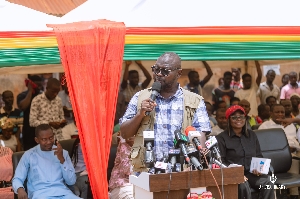Opinions of Thursday, 17 September 2009
Columnist: GNA
Towards an Integrated, Peaceful and Prosperous Africa: The AU in Perspective
(A GNA feature by Mohammed Nurudeen Issahaq)
Accra, Sept. 15, GNA - The vision of a united, peaceful and prosperous Africa has been a long cherished but elusive ideal whose early advocates included Marcus Garvey; George Padmore; W.E.B. DuBois; Kwame Nkrumah of Ghana, Haile Selassie of Ethiopia; Gamel Abdul-Nasser of Egypt and Jomo Kenyatta of Kenya, among others.
After being mentioned in passing at various continental forums, the idea of creating an African Union (AU) along the same lines as the European Union (EU) was vigorously revived in the mid-1990s, this time spearheaded by the Libyan Leader, Muammar al-Qaddafi. The move was concretized with the adoption of the Sirte Declaration at a conference of OAU Heads of State and Government in the Libyan town of Sirte on September 9, 1999, calling for the creation of an African Union. Although established in 2001, the AU was formally inaugurated to replace the OAU on July 9, 2002 in Durban, South Africa. The birth of the AU was hailed with hope and euphoria across the African continent, as well as among well-wishers and people of African descent throughout the world. To a large extent, the event was regarded as a re-awakening of the Pan-Africanist dream. More importantly, it was also seen as a clarion call to end Africa's nightmare of poverty and underdevelopment.
At its inauguration in 2002, the AU set itself a 10-year grace period, dubbed the 'period of stabilization,' within which it would turn things around and set Africa on the path to sustainable development. Among other benefits, integration was expected to bring along prospects such as the opening up of larger regional markets for African producers and consumers. The Union has set as its primary targets the acceleration of economic, political and social integration of Africa, with the establishment of a United States of Africa as its ultimate goal. It also places premium on the promotion of human rights, as well as the entrenchment of democracy and good governance on the African continent.Challenges:
Indeed the objectives of the AU are lofty, and its benefits immense, but Africa's road to integration is fraught with formidable challenges. Seven years after its inauguration, the AU is yet to put its act together. The vast majority of Africa's population is yet to know about the AU and to feel its impact in their everyday lives. The momentum, the spark that is needed to ignite the flame of integration has obviously not occurred yet because apart from the routine conferences, things are a bit too quiet for comfort on the AU front. The impediments confronting the Union are both externally and internally generated - bad governance, huge foreign debts, crushing poverty and endemic armed conflicts, which together with a myriad of other constraints; present a formidable threat to the attainment of the ideal of a unified Continent. The dilemma posed by the dichotomy between state sovereignty and regional integration is another obstacle that must be surmounted.
There are, also, the problems created by territorial boundaries. Travelling across the border of one African country to the next remains a nightmare, with numerous road checkpoints where ordinary travellers and traders routinely have to pay bribes to security personnel on duty in order to get through. This does not only create a disincentive but is also a direct contravention of the principle of free movement of people, goods and capital as enshrined in the charters of both the AU and the Economic Community of West African States (ECOWAS).
By far the most outstanding and most crucial challenge confronting the AU and Africa's quest for integration, however, is the apparent non-performance of the various Regional Economic Communities (RECs) on the Continent. The reactivation and harmonization of the RECs is what would actually propel Africa's integration process forward. Considering the large membership of the AU (53 nations) and other peculiar characteristics of the African continent, the RECs are essential building blocks or linchpins whose effective function is a vital prerequisite to any successful integration process on the Continent.
Unfortunately, long after the attainment of political independence, African nations have not shaken their colonial-era economic patterns, with each one of them struggling to undo a long-standing legacy dominated by trade with their former colonial rulers rather than with each other. Whereas intra-African trade in 1998 stood at about 11.4 per cent, trade between African nations and the industrialized world as a whole was 61.2 per cent during the same period, out of which trade with the EU alone accounted for more than 40 per cent. That picture remains pretty much the same even today. The issue of concern here is that the prevailing terms of trade between Africa and the developed world, have been far from favourable to African nations. One would expect the development partners to demonstrate that they are true partners by supporting African states to industrialise their economies and set them on the path of sustainable development, rather than dolling out aid money.
Significantly, however, the question of external support from Europe and other parts of the developed world could become a double-edged sword. On the African continent where no effective supranational institutions exist yet, the situation is further worsened by the division of the countries into Francophone, Anglophone and Luxophone zones. But the exclusive support of a 'godfather' in the African scenario - France, Britain or Portugal, for instance - on the basis of past colonial ties, tends to produce 'zones of influence' which can only exacerbate the prevailing trend of dependency on the Continent. Unfortunately, the 'godfather syndrome' is already a reality in African politics. To a large extent, it is responsible for the low level of trade and cooperation among African countries and, for that matter, the ineffectiveness of the RECs.Europe's Experience:
In the study of regional integration, the EU is said to have become a living laboratory where any part of the world embarking on the exercise of integration must necessarily visit for a tip or two. Therefore, it would be useful at this juncture to take a brief glance at Europe's experience. From the perspective of history, the idea of European integration is rooted in the tragic events of the World Wars, which set nations in Europe on the search for lasting peace and co-operation, following the devastation of their major cities and the destruction of their economies during several years of battles. The search for peace eventually led to the quest for integration. In deed, the legacy of Jean Monnet, who is reputed as one of the founding fathers of the European Community, lies in his desire to remove forever the causes of war that periodically tore Europe apart.
Identifying the lack of unity as the cause of strife between European states, French Foreign Minister Robert Schuman in his May 9, 1950 declaration in Paris went on to table the French Government's proposal which placed Franco-German production of coal and steel under a common 'high authority', and which eventually led to the formation of the European Coal and Steel Commission (ECSC) in 1951. Originally, the Commission comprised six countries - France, Italy, the Federal Republic of Germany, Belgium, The Netherlands, and Luxembourg. It was envisaged that this move would bring about a common cause or unity of purpose, thus providing the foundation for a deeper collaboration between countries, "whose conflicting interests have for a long time kept them bloodily engaged".
About six decades down the lane, the EU has not only expanded in terms of membership (currently 28 nations) but has also become the world's most successful example of regional integration, reaping the benefits (as well as challenges) that come along with a virtually borderless Continent and a huge market.
The EU approach to integration, according to experts, is in line with Functionalist thought, which places emphasis on cooperation in the economic, social, and technological spheres. It draws a clear distinction between the utilitarian welfare aspects of inter-state relations, and the political aspects dealing with law and order, security and sovereignty. The functionalist approach seeks to shift emphasis from political issues which divide, to those social issues in which the interest of the people is plainly identical and collective. ".shift the emphasis from power to problem and purpose", in the words of Ernst Haas [1964]. By such a strategy it is both essential and possible to replace mutual suspicion with growing trust that would promote peaceful relations and extend co-operation to many more sectors than those intended originally.
The Here and Now:
Deutsch argued that groups of countries would integrate or come together to form unions when they are confronted with a common threat (such as the devastating inter-state wars in the case of Europe). Although in Africa's particular circumstances there is no history of bloody inter-state conflicts, there is the combined scourge of poverty, hunger and disease. Arguably, the devastation and misery caused by these conditions surpass that experienced by Europe in the two World Wars and should, therefore, suffice as a motivating factor or catalyst to bring African countries together to seek common solutions to the problems that afflict their people.
The agricultural sector is one area that could provide a springboard for the much needed activation of the RECs, as well as the heightened level of economic cooperation that has so far eluded the Continent. African countries could begin integrating their economies in the agricultural sector since they are all essentially agrarian - just in the same way as European integration started from the industrial sector with the pooling of coal and steel production. It would be prudent to pursue of a policy similar to the EU's Common Agricultural Policy (CAP), which would place emphasis on joint action in the agricultural sector and agro-processing or adding value to agricultural produce.
At a meeting in Sirte, Libya in July 2009, leaders of the African Union (AU) rightly emphasized the need for increased collaboration in the agricultural sector as the Continent's way out of the current global economic crisis. Committing more resources to agriculture would not only enable them to make food available for the teeming population, but also generate jobs for the unemployed if pursued with the requisite commitment and consistency. The Sirte decision, therefore, is one line of action the Heads of State and Government should pursue without any further delay
Each region on the Continent could maximize the production of specific agricultural commodities based on the principle of comparative advantage, thereby preparing the terrain for effective collaboration amongst the various RECs on the Continent. In addition to enhancing food self-sufficiency, the system of interdependence thus created would help to accelerate the Continent's integration process. Why, for instance, does Mali have to import palm oil from Indonesia for industrial use when it could get the commodity from Nigeria at a comparatively cheaper cost? That is the kind of situation the RECs are meant to rectify so as to pave the way for increased intra-African trade and collaboration. The greatest challenge of this era is for African Governments to demonstrate in practical terms their readiness to embark on a deliberate and sustained plan to transfer elements of state sovereignty to the newly established AU supranational institutions. Nationalism and integration are incompatible. The issue of political will on the part of African Leaders is, therefore, very essential, as the successful devolution of power from the national to supranational institutions would depend on their active and voluntary cooperation. Beginning from the economic front, it is possible for governments to work towards a united Africa through the development of common institutions, the progressive fusion of national economies, the removal of tariffs and trade barriers amongst them, the creation of a common market and the progressive harmonization of their social policies. The apparent absence of intellectual interest in Africa's integration process is another inhibiting factor as far as the AU's progress is concerned. The theorizing and scholarly debates that characterized the evolution of European integration, and which served to refine the process, is completely absent in Africa's case. Academicians and scholars in every part of the Continent need to come out with published works to generate healthy debates and sustain the interest of the citizenry in the integration process.
Critics also point out the absence of committed technocrats - an African 'Jean Monnet' or 'David Mitranny' - who would provide the vital inspiration and guidance that would accelerate the Continent's integration process.
The creation of strong/viable institutions, steadfast/consistent policy implementation, safeguarding the Continent's internal peace/stability on a sustainable basis, and adopting a progressive culture of commitment to the supreme interest of the Union, are some key lessons from the EU experience that the AU must learn.
Reducing the dependency on foreign aid, as well as improving the governance and conflict resolution mechanisms, are the other important steps to a successful integration and a prosperous Africa, but these should be pursued at a pace that is both ambitious and realistic. European integration began with the joint production of coal and steel, which with time spilled over into cooperation in other sectors including security and defence. In Africa the manufacturing base is almost non-existent but this deficiency can be turned into an opportunity if African Governments unanimously declared an industrial revolution and worked collectively and consistently towards its realization. From whatever angle one looks at the issue of African unity, one cannot but conclude that getting the RECs and other essential structures/institutions functioning efficiently and effectively before moving on to the ultimate goal of Union Government, or United States of Africa, seems to be a more logical arrangement.












